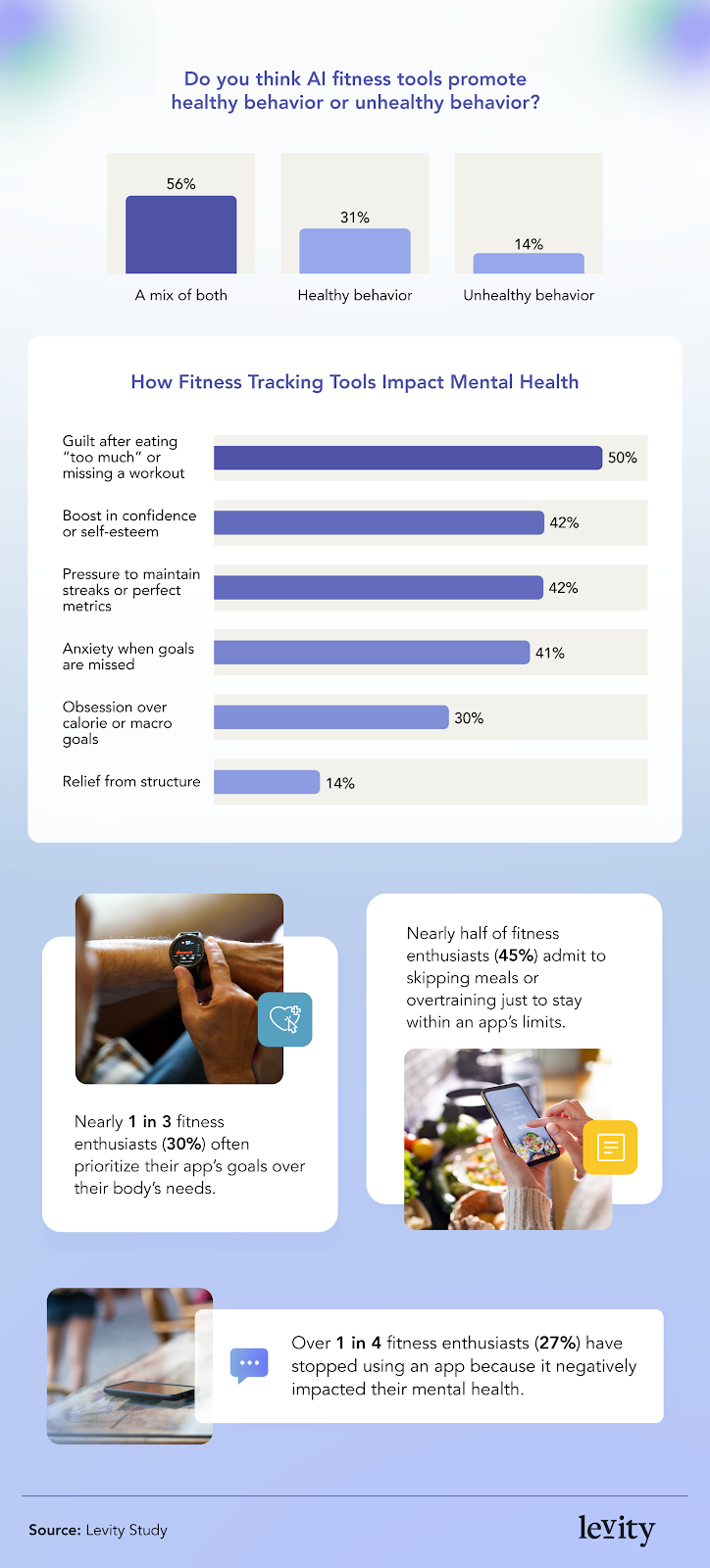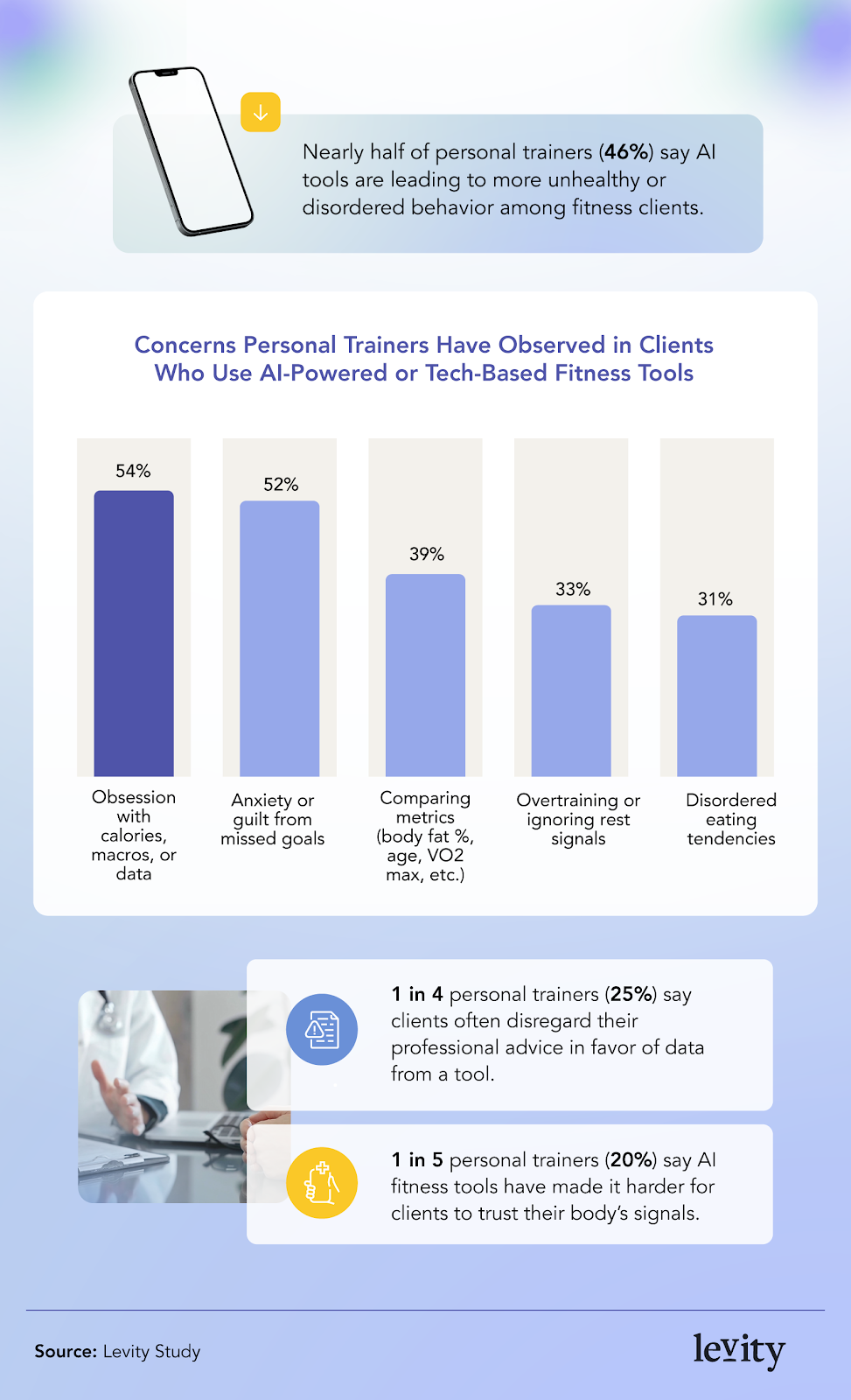Ozempic Availability: Where to Buy Ozempic In The USA
In this blog post, our Levity experts cover what Ozempic is, who can take it and how you can get access to it.
AI-powered fitness tools promise smarter health decisions, but are they pushing users too far? Levity surveyed 900 fitness enthusiasts and 100 personal trainers to uncover how AI fitness tools, including calorie tracking apps, wearables like Fitbit or Oura, and AI-generated goal-setting programs, are influencing mental health. The findings highlight a growing tension: while some users feel empowered, others experience anxiety, pressure, and harmful habits. This matters for anyone using digital tools to support weight loss, especially those on GLP-1 medications or other medically guided plans, since these treatments already affect appetite, eating patterns, and energy levels. For this group, rigid digital tracking may add pressure at a time when flexibility and clinical guidance are most important.
Fitness tracking tools are popular for a reason. For many people, they offer structure, accountability, and a clear path toward progress. But the same tools that help some users feel in control may lead others to ignore their body’s needs or develop unhealthy habits.

The top reasons users gave for using tracking apps included staying motivated (66%), controlling weight or body fat (47%), and improving performance or recovery (43%). Some also used them to avoid missing progress (32%), manage food or fitness anxiety (15%), or because they felt guilty when they didn’t track (8%).
At first glance, these motivations can appear healthy. But nearly 1 in 3 fitness enthusiasts said they often prioritize their app’s goals over what their body actually needs. Nearly half (45%) admitted to skipping meals or overtraining to stay within the app’s limits, and 38% said they ignored hunger or fatigue because the app told them to keep going.
This emotional toll is why 61% of users reported feeling anxious after missing a day of tracking, and 13% said it made them feel like they had failed. Younger generations were the most affected, 66% of millennials and 61% of Gen Z felt anxious about missed tracking, compared to just 37% of Gen X and baby boomers.
Not everyone sees food tracking as neutral. More than 1 in 10 users (13%) believe tracking food or calories can qualify as an unhealthy habit. Gen Z was most likely to feel this way, with 17% expressing concern, compared to 12% of millennials and only 11% of older generations.
The pressure to perform doesn’t end with personal goals. Over 1 in 4 fitness enthusiasts (27%) said they felt pushed to share their tracking data or progress online. Gen Zers were especially affected: 38% said they felt this pressure, compared to 28% of millennials and just 20% of Gen X.
Perhaps most telling, more than a quarter of users (27%) reported quitting an app because it was affecting their mental health. For many, the line between healthy tracking and unhealthy fixation was easier to cross than expected.
Behind the data, real professionals are sounding the alarm about the unintended effects of AI fitness tools on their clients' well-being.

Nearly half of personal trainers (46%) said they’ve observed AI fitness tools contributing to disordered behaviors among their clients. One in five said these tools make it harder for people to trust their own bodies, and 25% said clients often disregard professional advice in favor of data from a tool.
For many trainers, this means damage control. Seventy-nine percent said they’ve had to re-educate clients after they followed inaccurate or harmful advice from an AI-generated plan. Just under half (45%) reported that their clients frequently rely on AI-generated goals to guide workouts, often without checking in with a real expert.
Emotional fallout is common. Sixty-three percent said tracking tools had a mixed emotional impact on their clients, and 71% had seen clients become anxious or upset after missing a day of logging. Meanwhile, 53% felt professionally undermined by clients who trusted apps more than their trainer's input.
Still, results are not always negative. About one-third of trainers (32%) said their clients often achieve better outcomes with the help of AI fitness tools. And when trainers are part of the equation, they have several ways of helping clients reset.
Personal trainers aren’t just responding to AI; many are using it in their own work. Nearly half (46%) use tools like ChatGPT to create plans or communicate with clients. Others rely on wearable integrations (30%), workout programming tools (30%), or AI-driven nutrition estimators (30%). However, one in four (25%) said they don’t use AI fitness tools professionally at all.
As for how AI affects their workflow, opinions are mixed. Forty-nine percent said AI has made their jobs both easier and harder. About a quarter (27%) felt it made their job easier overall, while 16% said it made things harder, and 9% noticed no real impact.
When clients become overly dependent on apps or AI-generated goals, personal trainers respond by:
AI can be a powerful tool for fitness, but it’s not a substitute for body awareness or professional guidance. When metrics feel overwhelming, consider stepping back to reconnect with how movement makes you feel rather than what the numbers say. For those navigating weight loss with GLP‑1 medications or other support, the goal should be balance rather than perfection. Consistency, compassion, and expert guidance matter more than hitting an algorithmic target.
Levity surveyed 900 fitness enthusiasts and 100 personal trainers to explore how AI-powered fitness, nutrition, and health-tracking tools are shaping the way people think about their bodies, mental health, and wellness, and when helpful data becomes harmful pressure. Among fitness enthusiasts, the average age was 38. Among them, 44% were women, 55% were men, and 1% were non-binary. Generationally, 26% were baby boomers or Gen X, 51% were millennials, and 23% were Gen Z. Among personal trainers, the average age was 37. Among them, 44% were women, 55% were men, and 1% were non-binary. Generationally, 18% Gen X, 54% were millennials, and 18% were Gen Z.
Levity offers long-term weight management support through personalized care and clinically-backed medications. Explore Compounded Liraglutide with B-12, an alternative GLP-1 treatment option, designed to help you reach your health goals with confidence. Levity’s U.S. based team of clinicians and dietitians provides expert guidance every step of the way.
If you’d like to share these findings for noncommercial use, please include proper attribution and a link back to Levity. We support responsible sharing of information that promotes health and well-being.